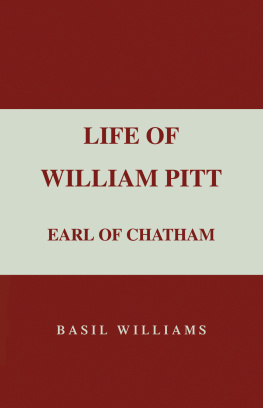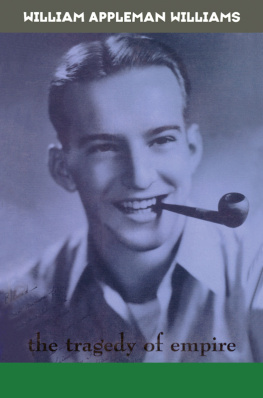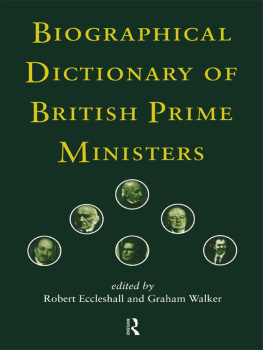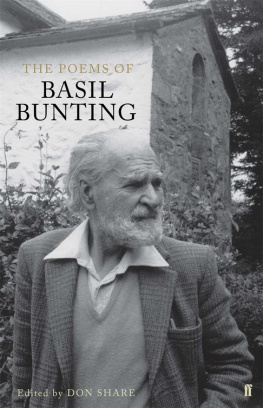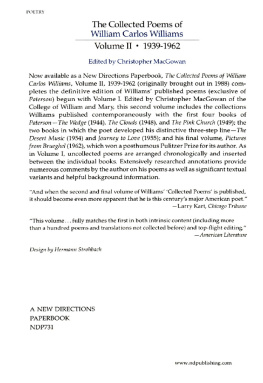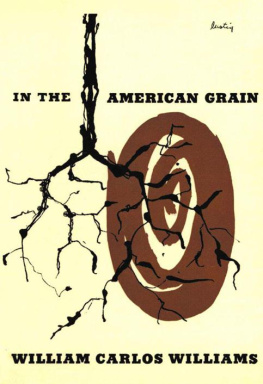THE LIFE OF WILLIAM PITT
EARL OF CHATHAM
VOLUME ONE
STATUE OF WILLIAM PITT, EARL OF CHATHAM, IN CORK
By Joseph Wilton
(1766)
THE LIFE OF WILLIAM PITT
EARL OF CHATHAM
BASIL WILLIAMS
VOLUME ONE
First published in 1913 by Frank Cass & Co. Ltd.
This edition published 2013 by Routledge
2 Park Square, Milton Park, Abingdon, Oxon OX14 4RN
711 Third Avenue, New York, NY 10017
Routledge is an imprint of the Taylor & Francis Group, an informa business
Second Impression 1914
Third Impression 1915
Fourth Impression 1966
ISBN 0415410053 (hbk)
UXORI
AUXILIANTI
FILIS
AUXILIO
PREFACE
THE Great Commoners chief glory is not to have won an Empire, but to have united a people. He was understood and loved of Englishmen, Scotsmen, Irishmen, Americans of his day, because he had sympathy with them and called forth what was best in them for themselves and for those whom they were charged to rule. The object of this book is to give a picture of Pitt, true to life and captivating the people, whom he served and loved. He has sometimes suffered in history because the people who appreciated him at his highest were inarticulate and have left the field to the surmises of courtiers, Whig magnates and gossips, whom he sought not to please. By his actions and his speeches, more truly, perhaps, than any other orators, the mirror of his soul, he should principally be judged, if we would understand what he meant and still means for England. This I have attempted in all humility and in the spirit of Brownings traveller,
Here and here did England help me: how can I help England?say
Whoso turns as I, this evening, turn to God to praise and pray.
In preparing this biography I have read many books and manuscripts. In the text my references have been principally to unpublished authorities, but I have thought that it might be useful to others, anxious to pursue this or cognate subjects further, to have authorities for the speeches and a bibliography at the end of the book. I feel, however, that it is not merely from books and manuscripts that one can learn to appreciate Chatham If this book has any merit, it is due less to them than to the example of my Father and Mother and to my good fortune in having had some experience of military and civil affairs.
The work required for the book has been lightened by many acts of kindness. To the Marquis of Lansdowne, the Earl of Egmont, Lord Lucas and Mr. Pretyman, I owe warm thanks for unrestricted permission to use their manuscripts; also to the owners of houses where Pitt lived for being allowed to roam through them. From those in charge of the London Library, the British Museum MSS. Department, the Record Office, and the Archives of the Ministre des Affaires trangres I have received that ungrudging help which it is the pride of those great institutions to afford to students.
To Mr. George Trevelyan I owe much for his inspiring encouragement and to Mr. Erskine Childers for his valuable suggestions. Mr. Denys Winstanley most generously read through and gave advice on the whole of the proof-sheets: it is difficult to thank him enough for the advantage I have derived from his accurate and extensive knowledge of Chatham and the period. Mrs. Hilary Jenkinson has stood by the book for over a year: for her scholarly researches and her unstinted help I am most deeply grateful.
BASIL WILLIAMS.
BANK FARM, HOLTYE, SUSSEX.
Octobet 15, 1913.
CONTENTS
OF
THE FIRST VOLUME
ILLUSTRATIONS TO VOLUME I
PORTRAITS
STATUE OF WILLIAM PITT, EARL OF CHATHAM, IN CORK By Joseph Wilton (1766). See vol. ii, p. 121 note. |
From a painting in the possession of E. G. Pretyman, Esq. (From Dr. Holland Roses William Pitt, by kind permission of Messrs. G. Bell & Sons, Ltd.) |
CHAPTER I
GOVERNOR PITT
They well deserve to have,
That know the strongst and surest way to get.
SHAKESPEARE, Richard II, iii, 3.
WHILE William Pitt was still a boy at Eton, it is recorded that his grandfather Thomas, the great Governor of Madras, used occasionally to fetch him over to his house at Swallow-field, and took favourable notice of the boys capacity. In those days the old man was a gnarled and embittered person, wearied with a long life of toil, soured by the endless feuds of his quarrelsome family, and burdened with the care of his scattered properties. His portrait, which still hangs at Chevening, shows a short, thick-set, determined man, with the diamondno doubt to his mind his greatest acquisitionshining gloriously in the hat by his side, and his left foot with the large heel, in which tradition says he carried it over to France, thrust prominently into the foreground. A mighty imperious man, unsparingly laborious in pursuit of his aims, and full of explosive energy, he was too shrewd a judge of men not to recognise the same strain in his grandson, a strain he had missed bitterly in his own sons. Melted by this sympathy of spirit, he must often have growled out to the boy stories of his own hard fights in youth, and of the stern task accomplished during his anxious years as Governor at Madras. And it must have been from him that William inherited his stern directness of vision, his love of England, and his peculiar insight into the minds of merchants and traders and sympathy with their aims, a sympathy which gained him the friendship of the Allens and Beckfords, and that great backing of City merchants who closed up round him and supported him whenever the Court or the great Whig families tried to crush him. He also, unfortunately, inherited from the old man that impatience of opposition, which often stood in his way, and that virulent form of gout, which, on one occasion at least, proved a dire calamity to himself and to the country.
Governor Pitt, the old buccaneer, is best known to history as the owner of the Pitt Diamond, which afterwards glittered in the sword of his great grandsons mighty foe. But he was remarkable for more than this. He broke the ground for the achievements of his descendants, and formed a link in their succession from the bygone Raleighs and Drakes. With all the Elizabethan sailors audacious disregard for imposing appearances he attacked effete monopolies and helped the vigorous current of British commerce and energy to force a new channel to distant parts of the world: like Chatham and Pitt, he showed that the British adventurers who had insolently ravished an empire could hold and rule it. A sturdy adventurer was Governor Pitt, as ever set out from England, and yet with a deal of public spirit and love of country mixed with his passion for adventure. There is not one of his forbears that the great, dignified, yet fiery Earl of Chatham takes after so much as this desperate fellow, this roughling immoral man; it is worth while, therefore, to know him, and through him to understand more of that lonely and mysterious grandson.



